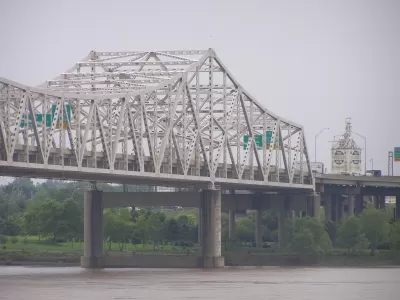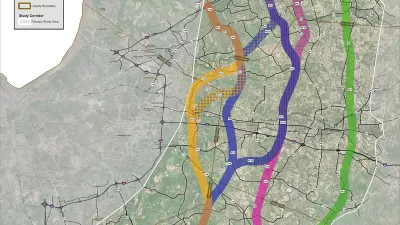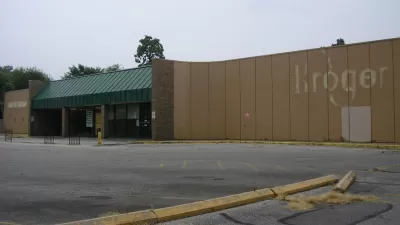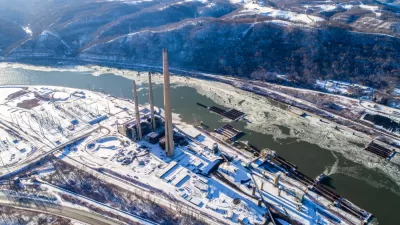Aaron Renn says the bridge projects in and near Louisville, Kentucky, were too expensive and have not led to any positive transportation or economic results.

In a piece on his blog, Aaron Renn writes about the Louisville-Southern Indiana Ohio River Bridges Project, which he says he was skeptical about back in 2007 when the proposal was first floated.
After taking a closer look at the traffic data, he says the outcome is even worse than he imaged. “The project has proven to be a money waster of the highest order, and in fact by far the biggest American transportation boondoggle I can identify in the 21st century so far,” says Renn.
The Interstate 65 bridge is a parallel span connecting Louisville, Kentucky, to Jefferson, Indiana, and it doubled the number of lanes across the river. The East End Crossing is a new bridge built up the river from downtown Louisville. The price tag for each bridge was $1.38 billion, and both crossings added tolls to help cover the project costs. The result, says Renn, is that traffic shifted to the two free bridges in the area, and the number of vehicles on the I-65 bridge dropped 50 percent between 2013 and 2018.
He also argues that expanding the crossing in downtown Louisville sliced up the area in detrimental ways. In addition, he points to data showing that truck traffic on the I-65 spans dropped by over 30 percent. “Where did they go? If you are a region that’s banking on the distribution industry for a big part of your future blue-collar employment growth, the tolls on these bridges can’t be good news. That’s particularly true when no surrounding competitor city has tolls.”
Renn says the bridge project made no sense, both from a transportation perspective and a fiscal one. And at a time when states claim funding for transportation projects is tight, pouring money into a project like this one, while better projects fall by the wayside, is problematic, he says. “This boondoggle didn’t happen by accident. It wasn’t a result of ignorance. It was well known in advance that it was a bad idea. It was a deliberate, conscious choice.”
FULL STORY: Louisville Bridges Project Is the Biggest Transportation Boondoggle of the 21st Century

Study: Maui’s Plan to Convert Vacation Rentals to Long-Term Housing Could Cause Nearly $1 Billion Economic Loss
The plan would reduce visitor accommodation by 25,% resulting in 1,900 jobs lost.

North Texas Transit Leaders Tout Benefits of TOD for Growing Region
At a summit focused on transit-oriented development, policymakers discussed how North Texas’ expanded light rail system can serve as a tool for economic growth.

Why Should We Subsidize Public Transportation?
Many public transit agencies face financial stress due to rising costs, declining fare revenue, and declining subsidies. Transit advocates must provide a strong business case for increasing public transit funding.

How Community Science Connects People, Parks, and Biodiversity
Community science engages people of all backgrounds in documenting local biodiversity, strengthening connections to nature, and contributing to global efforts like the City Nature Challenge to build a more inclusive and resilient future.

Alabama: Trump Terminates Settlements for Black Communities Harmed By Raw Sewage
Trump deemed the landmark civil rights agreement “illegal DEI and environmental justice policy.”

Dear Tesla Driver: “It’s not You, It’s Him.”
Amidst a booming bumper sticker industry, one writer offers solace to those asking, “Does this car make me look fascist?”
Urban Design for Planners 1: Software Tools
This six-course series explores essential urban design concepts using open source software and equips planners with the tools they need to participate fully in the urban design process.
Planning for Universal Design
Learn the tools for implementing Universal Design in planning regulations.
City of Santa Clarita
Ascent Environmental
Institute for Housing and Urban Development Studies (IHS)
City of Grandview
Harvard GSD Executive Education
Toledo-Lucas County Plan Commissions
Salt Lake City
NYU Wagner Graduate School of Public Service





























